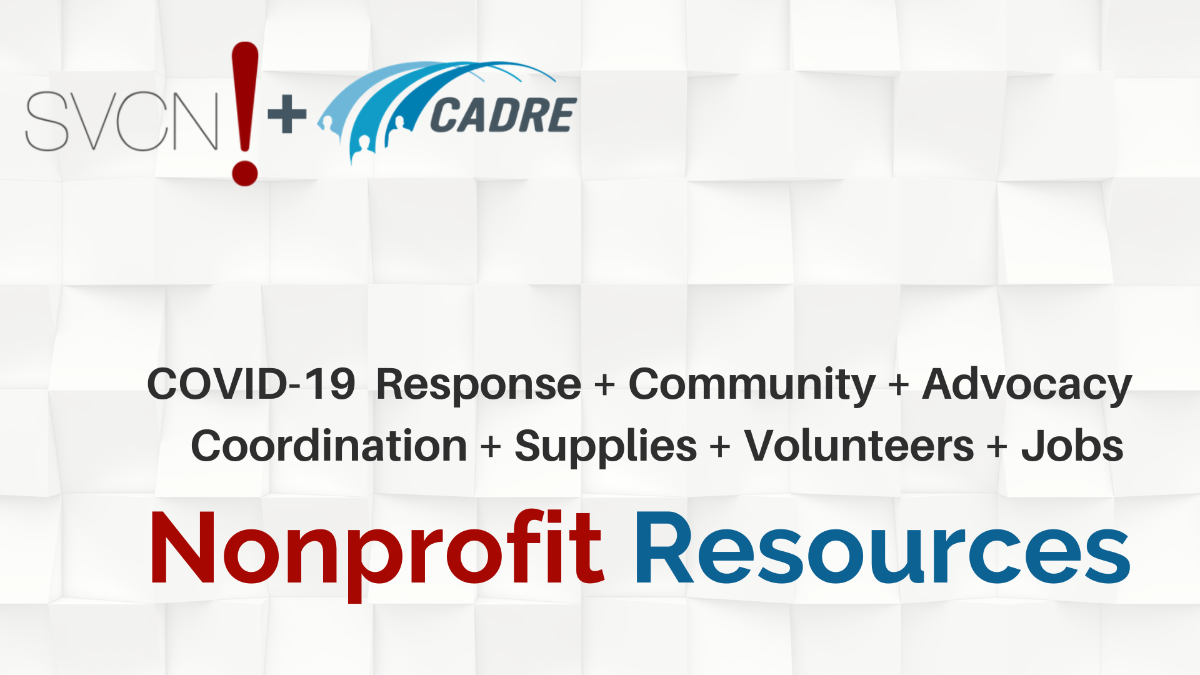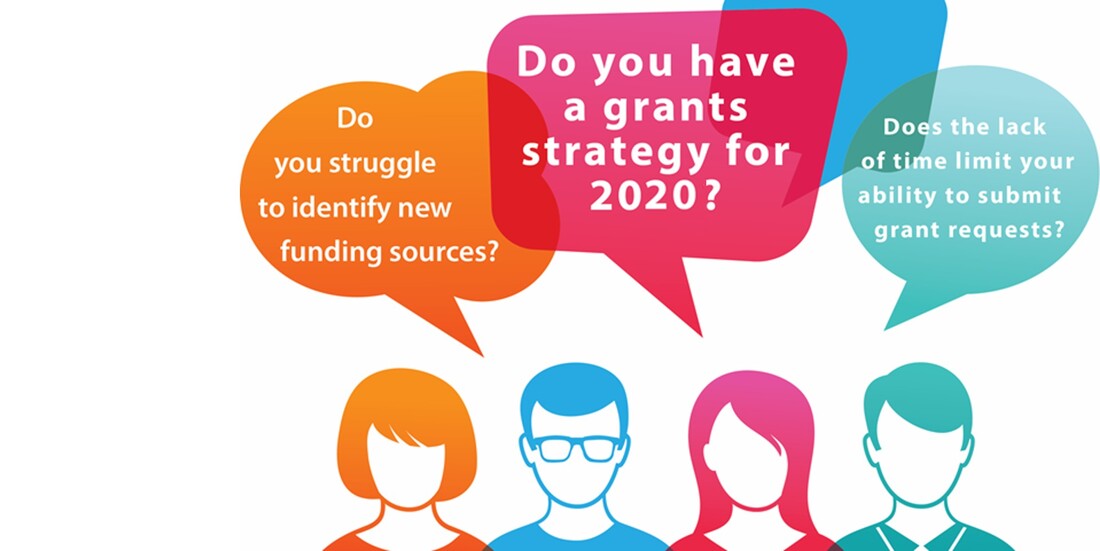COVID-19 Nonprofit Support
Here at AdvancED we believe whole-heartedly in the complete person. If you work for or manage a nonprofit, you are undoubtedly facing challenges and decisions at your organization and across the communities that you serve.
We're sharing federal, state, local, public, and private resources to help you navigate your nonprofit challenges.
We're sharing federal, state, local, public, and private resources to help you navigate your nonprofit challenges.
|
SVCN/CADRE Trainings + Webinars
From SVCN SVCN + CADRE have published many of our recent webinars on both organization's websites. You can find: |
|
COVID-19 Resources for Nonprofits and Funders From The Bridgespan Group We’ve pulled together a collection of online resources that offer valuable guidance on navigating the current times—both responding to the pandemic and preparing for the possibility of an economic downturn. If you have relied on other resources your peers would find valuable, please let us know by sharing here. |
COVID-19 Response Funds
From GrantStation
The following are different response funds, relief funds, and other opportunities for nonprofits. Learn more about GrantStation and follow them on LinkedIn for more opportunities!
The following are different response funds, relief funds, and other opportunities for nonprofits. Learn more about GrantStation and follow them on LinkedIn for more opportunities!
- COVID-19 JOINT RESPONSE EFFORT FOR SANTA BARBARA COUNTY Community Disaster Relief Fund: https://www.sbfoundation.org/covid-19-response-grants/
- SFF COVID-19 Emergency Response Fund: https://sff.org/for-nonprofits-apply-for-a-grant-from-the-sff-covid-19-emergency-response-fund/
- COVID-19 and the Bay Area LGBTQ Community: https://www.horizonsfoundation.org/covid19/
- COVID-19: A Just East Bay Response Fund: https://www.ebcf.org/covid-19-fund/
- The De Colores Rapid Response Fund: Support for organizers responding to COVID-19: https://myemail.constantcontact.com/COVID-19-Rapid-Response-Funding---Rural-Renaissance--in-Community-Organizing.html?soid=1103565212350&aid=GwQNiM2F3rs
- MusiCares COVID-19 RELIEF FUND: https://www.grammy.com/musicares/get-help/covid-19-relief-fund-faq
- Freelancers Relief Fund: https://www.freelancersunion.org/resources/freelancers-relief-fund/
- The Equal Sound Corona Relief Fund: https://equalsound.org/project/corona-relief-fund/
- The Creator Fund: https://creatorfund.ck.page/
- Emergency Grant for Humanitarian Non-profit Organizations: http://www.kinkadefamilyfoundation.org/emergencygrantfornonprofits
- Tegan and Sara Foundation Community Grants: https://www.teganandsarafoundation.org/communitygrants
- Verizon Small Business Recovery Fund: https://www.lisc.org/covid-19/verizon-small-business-recovery-fund/
- Oakland Small Business Emergency Grant Program: https://www.workingsolutions.org/oakland-grants
|
Regional Nonprofit Emergency Fund From Silicon Valley Community Foundation Hosted by Silicon Valley Community Foundation, the Regional Nonprofit Emergency Fund will be administered by community foundations throughout the 10-county Bay Area region. The fund will be used to provide flexible operating support grants to nonprofit organizations serving one or more of the 10 counties. APPLICATIONS ARE NOW OPEN, with a maximum request of $50,000 per applicant. Click here for the Grant Applications and/or to Donate. WHAT (San Mateo & Santa Clara): Operating grants for nonprofit organizations (with a 501c (3) designation) that SVCF has pre-qualified to provide emergency-related services: food, shelter, health and mental health services to affected communities. SVCF will also provide operating grants for nonprofits that have experienced unexpected costs due to the COVID-19 pandemic as described below. WHAT (Bay Area): Operating grants for nonprofit organizations that have experienced unexpected costs due the COVID-19 pandemic. |
COVID-19 Regional Response Fund From Silicon Valley Community Foundation Hosted by Silicon Valley Community Foundation, the COVID-19 Regional Response Fund will work with trusted lead partner organizations in the 10-county Bay Area region. The fund will provide operating grants to the organizations listed below, which have deep roots in the community. These lead community-based organizations, in turn, will support those affected by the COVID-19 pandemic. Click here for the Grant Applications and/or to Donate. WHO: Neighbors we expect to serve include some of the most vulnerable in our community, such as: Residents without health insurance and/or access to sick days, People with limited English language proficiency, Healthcare and gig workers, and Communities of color. WHAT: This regional fund will provide flexible resources and focus on basic needs: housing/shelter, food, clothing, financial assistance (determined by need). |
Resources Available to Help Nonprofit Stay Afloat During COVID-19
From John Burton Advocates for Youth
Foundations and other non-profits are responding with new resources, ranging from emergency grants to supports that help workers cope with the switch to remote working. John Burton Advocates for Youth has compiled a list of some of the resources we have found:
GrantStation is updating a list of local and national foundations offering emergency funding opportunities for nonprofits in the area of COVID-19, updated each business day and listed by deadline date.
Candid., the organization formerly known as Guidestar, has a list of funders who are responding to the pandemic with emergency funding opportunities.
Candid. is also compiling a list of emergency financial resources for individuals and small businesses facing COVID-19 hardships.
Youth providers should inquire with their Continuums of Care (CoCs), counties—and for those in one of the 13 large cities, their city—about applying for this funding locally to address the needs of homeless youth during the COVID-19 crisis. For technical assistance with applying for funding to address youth homelessness contact Simone Tureck Lee at JBAY. Note that the CoC for Santa Clara County is the Office of Supportive Housing.
From San Jose Downtown Association
The NEA announced its guidelines to distribute funding for nonprofit arts organizations impacted by COVID-19. The California Arts Council summarizes the announcement this way:
"$75 million has been appropriated to the National Endowment for the Arts through the CARES Act. Funds will be awarded in multiple categories.
Funds for Current and Recent Arts Endowment Grantees
More than 3,700 organizations that have received National Endowment for the Arts awards in the past four years are eligible to apply for a direct grant. Funds can be used for staff salary support, fees for artists or contractual personnel, and facilities costs. The direct grants will not require a cost share or match and will be for a fixed amount of $50,000.
Sub-granting Funds for Local Arts Agencies
Designated local arts agencies eligible to sub-grant may request $100,000 or $250,000 for sub-granting programs.
The deadline to apply is April 22, 2020 with the earliest announcement of grant award or rejection by June 30. Please see the Arts Endowment's website for program description, eligibility requirements, application review, and FAQs.”
Click for the NEA’s announcement and links.
From John Burton Advocates for Youth
Foundations and other non-profits are responding with new resources, ranging from emergency grants to supports that help workers cope with the switch to remote working. John Burton Advocates for Youth has compiled a list of some of the resources we have found:
GrantStation is updating a list of local and national foundations offering emergency funding opportunities for nonprofits in the area of COVID-19, updated each business day and listed by deadline date.
Candid., the organization formerly known as Guidestar, has a list of funders who are responding to the pandemic with emergency funding opportunities.
Candid. is also compiling a list of emergency financial resources for individuals and small businesses facing COVID-19 hardships.
Youth providers should inquire with their Continuums of Care (CoCs), counties—and for those in one of the 13 large cities, their city—about applying for this funding locally to address the needs of homeless youth during the COVID-19 crisis. For technical assistance with applying for funding to address youth homelessness contact Simone Tureck Lee at JBAY. Note that the CoC for Santa Clara County is the Office of Supportive Housing.
From San Jose Downtown Association
The NEA announced its guidelines to distribute funding for nonprofit arts organizations impacted by COVID-19. The California Arts Council summarizes the announcement this way:
"$75 million has been appropriated to the National Endowment for the Arts through the CARES Act. Funds will be awarded in multiple categories.
Funds for Current and Recent Arts Endowment Grantees
More than 3,700 organizations that have received National Endowment for the Arts awards in the past four years are eligible to apply for a direct grant. Funds can be used for staff salary support, fees for artists or contractual personnel, and facilities costs. The direct grants will not require a cost share or match and will be for a fixed amount of $50,000.
Sub-granting Funds for Local Arts Agencies
Designated local arts agencies eligible to sub-grant may request $100,000 or $250,000 for sub-granting programs.
The deadline to apply is April 22, 2020 with the earliest announcement of grant award or rejection by June 30. Please see the Arts Endowment's website for program description, eligibility requirements, application review, and FAQs.”
Click for the NEA’s announcement and links.
|
TechSoup's COVID-19 Resources for Nonprofits
Fundraising in the Time of COVID: A TechSoup Roundup will help nonprofits access the resources and insights they need to keep fundraising momentum going, even through this crisis. What Nonprofits Need to Know Now About the New CARES Act stresses that the forgivable loan for nonprofits part of the CARES Act, called the Paycheck Protection Program, will likely run out of money soon, so if you are interested in applying, do it as soon as possible. |
The Show Must Go On: Producing a Virtual Nonprofit Event has tips on how you can take your event online. Here are some benefits they mention:
- Operational costs are reduced compared to an in-person conference.
- More people can potentially attend.
- When recorded, you have content you can reuse or potentially monetize.
Finding Support in the Salesforce Partner Ecosystem: Free Resources for Nonprofit Organizations Amidst COVID-19
From Cloud4Good
There’s a reason the Salesforce.org community considers ourselves an Ohana, a family. We support each other and truly care about our client’s missions. As this community continues to adapt to the situation at hand, the Salesforce partner ecosystem has stepped up to offer a bevy of free resources that can be used to supercharge an organization’s ability to adapt and respond to the new normal.
Read more from Cloud4Good.
From Cloud4Good
There’s a reason the Salesforce.org community considers ourselves an Ohana, a family. We support each other and truly care about our client’s missions. As this community continues to adapt to the situation at hand, the Salesforce partner ecosystem has stepped up to offer a bevy of free resources that can be used to supercharge an organization’s ability to adapt and respond to the new normal.
Read more from Cloud4Good.
|
Coronavirus Quick Poll
From the National Association of Colleges and Employers NACE’s initial poll on members’ response to the coronavirus epidemic is now closed; final results for the June 2020 Quick Poll are posted below. NACE launched its fourth Coronavirus Quick Poll on June 1 as it continued to collect data from both employers and colleges to assess critical issues facing the field—from job offers to operations—as a result of this pandemic. The poll ran through June 30; these are the final results. |
Results as of July 1 for Employers (N=246):
Although a relatively small percentage of employers revoked the offers for full-time jobs they made to Class of 2020 college graduates, the number peaked for the time being, after growing substantially since NACE asked the question during NACE’s April quick poll. Still, delaying start dates or having full-time hires begin to work remotely were more common responses through June.
Results as of July 1 for Colleges (N = 477):
Both students and employers should expect reduced in-person career services available in the fall, with services shifting online or into a hybrid (in-person and online) format. While career fairs generally appeared to be staying on schedule, they, too, planned to move online at a substantial rate.
Although a relatively small percentage of employers revoked the offers for full-time jobs they made to Class of 2020 college graduates, the number peaked for the time being, after growing substantially since NACE asked the question during NACE’s April quick poll. Still, delaying start dates or having full-time hires begin to work remotely were more common responses through June.
- 7.8% of employers revoked or planned to revoke full-time offers to graduates from the Class of 2020. This percentage climbed overall, although it was down from 9.0% in mid-June. As a benchmark, this number reached about 9.5% at its peak during the Great Recession of 2008-09. Interestingly, the percentage of undecideds slowly increased during the month, possibly reflecting the negative news associated with state reopenings.
- 31% of responding employers delayed start dates for full-time hires from the Class of 2020. This percentage remained fairly stable throughout the month of June. Among employers delaying start dates, most (73%) reported the length of the delay was one to three months.
- 58% of employers planned to start full-time hires working remotely. This figure dropped consistently from 66% at the start of the month, likely reflecting that more workplaces were reopening and bringing people back to work at their physical locations.
57% of respondents still needed to determine the duration of the remote start for their new college hires, while 25% planned for the remote start to last one to three months.
Results as of July 1 for Colleges (N = 477):
Both students and employers should expect reduced in-person career services available in the fall, with services shifting online or into a hybrid (in-person and online) format. While career fairs generally appeared to be staying on schedule, they, too, planned to move online at a substantial rate.
- Clearly, career centers are providing more services either exclusively online or in a hybrid (in-person and online) format, significantly reducing the amount of services provided exclusively in person. For example, 68% of respondents offered drop-in career counseling only in person pre-COVID-19, while only 6% of respondents plan to do so in fall 2020.
- While selecting all answers that applied, 64% of career centers reported that professional staffing levels remained the same, and 15% reported professional staff was decreased. Additionally, 11% of respondents indicated that student workers will not be allowed into the physical space of the career center, while 39% noted that there are still decisions to be made around these staffing issues.
- 17% of career centers report that their budget has been reduced by more than 10% for fall 2020. This figure has remained steady, finishing at 16% at the conclusion of the May poll.
- Although 32% of career centers were still undecided about making changes in scheduling for their fall 2020 career fairs, 55% were staying on schedule, but moving fairs to a virtual space. As June progressed, those that were undecided did decide to stay on schedule, but move their fairs to a virtual space.
- 16% of career centers reported that their institutions moved up the start of the fall term to early August; this steadily increased from 8.5% at the beginning of the month. In addition, 62% indicated that no changes were planned, and the percentage of those that were undecided dropped from 39% to 22% over the course of the month.
Additional Resources for Nonprofits
You can find additional resources in this website by checking out what we have for Employees and Small Businesses. You can also get your organization involved in Advocacy efforts at the local and national levels. Serve educational organizations? Check out our K-20 resources.
AdvancED Consulting, LLC








